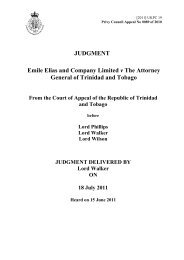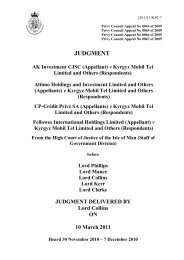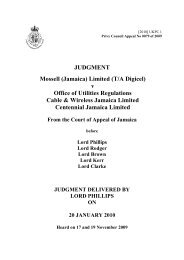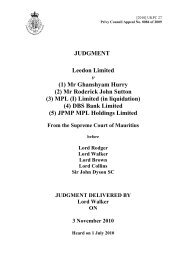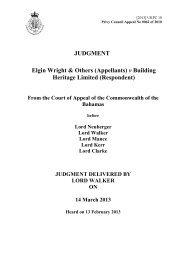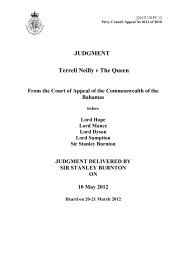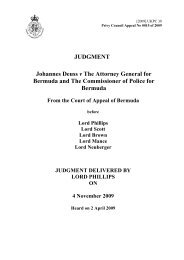Keith O'Connor v (1) Paul Haufman Percival Piccott (2) Eugene ...
Keith O'Connor v (1) Paul Haufman Percival Piccott (2) Eugene ...
Keith O'Connor v (1) Paul Haufman Percival Piccott (2) Eugene ...
Create successful ePaper yourself
Turn your PDF publications into a flip-book with our unique Google optimized e-Paper software.
“The transitional provisions … do not expressly deal with appeals. However, the<br />
general approach should be obvious. In reviewing a decision made prior to 26 April<br />
1999, this court will not interfere after that date if it would not have done so if the<br />
appeal had been heard prior to that date. This court only interferes with a decision<br />
of a court below if that decision was wrong. If the decision was not wrong prior to<br />
26 April 1999, it does not become wrong, for the purposes of an appeal, as a result of<br />
the subsequent coming into force of the rules. However, if the decision is one with<br />
which this court would have interfered prior to 26 April 1999, in deciding what order<br />
should be made for the future, this court will take into account, in particular, Pt 1 of<br />
the rules [in which the overriding objective is set out].”<br />
52. Mr Dingemans points out that the procedural rules which were in force in England prior<br />
to 26 April 1999 (the Rules of the Supreme Court) contained a rule in substantially the same<br />
form as rule 258 of the Code. He referred us in this context to the decision of the Privy<br />
Council in Strachan v. The Gleaner Co Ltd [2005] 1 WLR 3204 on an appeal from the Court<br />
of Appeal of Jamaica. The judgment of the Board was delivered by Lord Millett. At<br />
paragraph 21 of his judgment Lord Millett said this:<br />
“A default judgment is one which has not been decided on the merits. The courts<br />
have jealously guarded their power to set aside judgments where there has been no<br />
determination on the merits, even to the extent of refusing to lay down any rigid rules<br />
to govern the exercise of their discretion: see Evans v. Bartlam [1937] AC 473, 480<br />
where Lord Atkin (discussing the provisions of English rules in substantially the<br />
same terms as section 258) said:<br />
‘The principle obviously is that, unless and until the court has pronounced a<br />
judgment upon the merits or by consent, it is to have the power to revoke the<br />
expression of its coercive power where that has only been obtained by a failure to<br />
follow any of the rules of procedure.’” (Emphasis supplied)<br />
53. Accordingly, submits Mr Dingemans, notwithstanding the introduction of the CPR prior<br />
to the hearing in the Court of Appeal, section 258 remains of central importance in this case.<br />
54. Turning to the merits of the appeal, Mr Dingemans submits that the Court of Appeal<br />
failed to take into account the rights of Ms Hines as contracting purchaser of Flat 3; and that<br />
in the light of the history of this matter, and in particular the order of Harrison J on E353/89,<br />
an order for specific performance in favour of the respondents would be unworkable. He<br />
submits that the Court of Appeal gave excessive weight to the appellant’s admitted failures to<br />
meet procedural requirements; alternatively that in dismissing the appeal it failed to achieve<br />
the overriding objective of dealing with cases justly.<br />
55. For the respondents, Dr Lloyd Barnett accepts that the overriding objective applied to<br />
the hearing in the Court of Appeal, pointing out that in dismissing the appeal the Court of<br />
Appeal expressed itself as exercising a general discretion (see paragraph 32 of the judgment<br />
of McCalla JA quoted in paragraph 47 above). However, he submits that the appellant<br />
provided no valid basis on which the Court of Appeal could properly have exercised its<br />
discretion in his favour.<br />
56. As to any suggested inconsistency between the order of Ellis J and the order of Harrison<br />
J in action E353/89, Dr Lloyd Barnett seeks to rely on Mr Lyttle’s letter dated 4 September<br />
Page 9



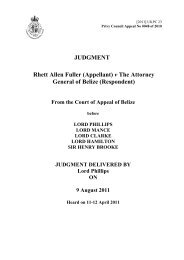
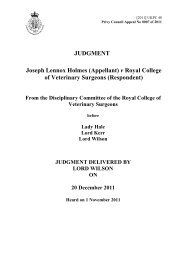
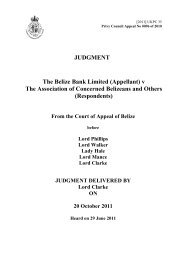
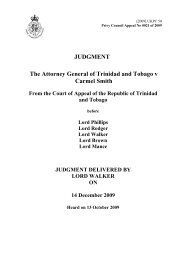
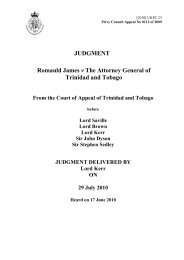
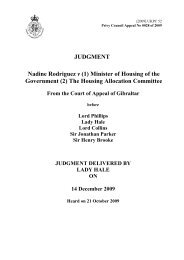
![[2011] UKPC 10 - Judicial Committee of the Privy Council](https://img.yumpu.com/23644185/1/184x260/2011-ukpc-10-judicial-committee-of-the-privy-council.jpg?quality=85)
